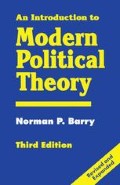Abstract
In 1931, when R. H. Tawney first published his famous book Equality, he lamented what he called ‘The Religion of Inequality’ in British society. The problem for him, as a strong egalitarian, was not merely that extremes of income and wealth existed and that the system of social stratification preserved outmoded class distinctions, but that they were accepted as inevitable, and even approved of, by those who stood to gain most from their removal – the working classes. The people accepted the mana and karakia (Tawney, 1969, p. 35) of social and economic inequality in the same way that primitive people accept the ritual of tribal society. According to Tawney, there was no rational justification for inequality; its survival was a matter of prejudice.
Preview
Unable to display preview. Download preview PDF.
Author information
Authors and Affiliations
Copyright information
© 1995 Norman P. Barry
About this chapter
Cite this chapter
Barry, N.P. (1995). Equality. In: An Introduction to Modern Political Theory. Palgrave, London. https://doi.org/10.1007/978-1-349-24104-0_7
Download citation
DOI: https://doi.org/10.1007/978-1-349-24104-0_7
Publisher Name: Palgrave, London
Print ISBN: 978-0-333-61682-6
Online ISBN: 978-1-349-24104-0
eBook Packages: Palgrave Political & Intern. Studies CollectionPolitical Science and International Studies (R0)

